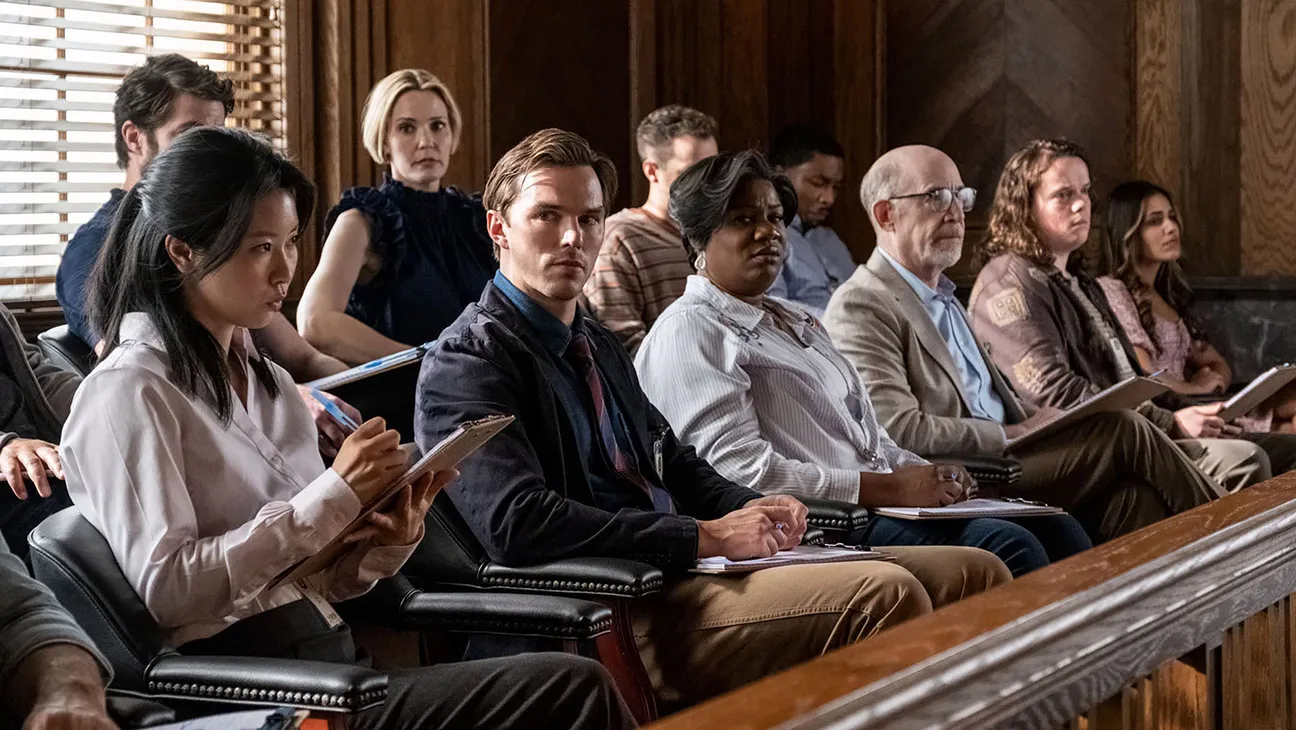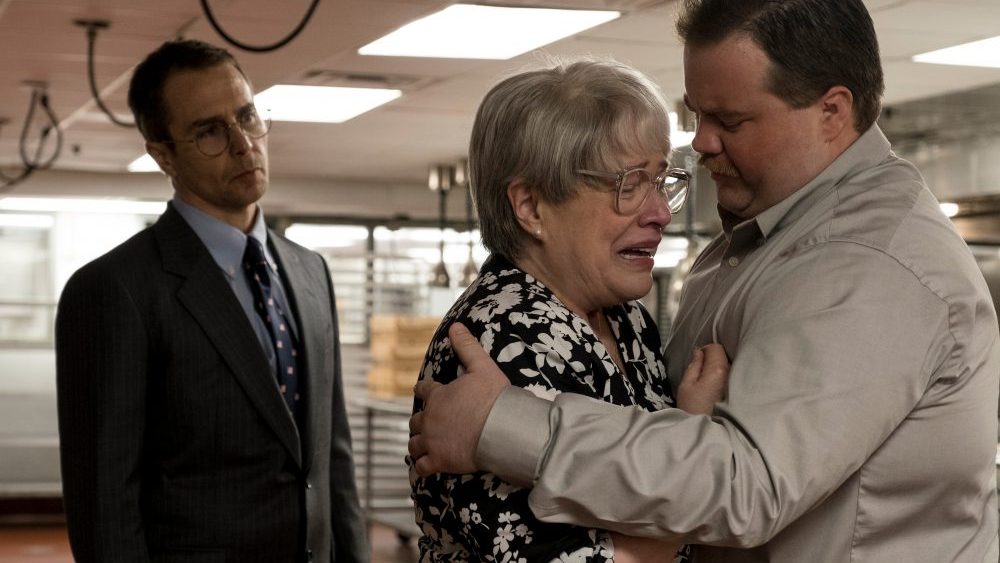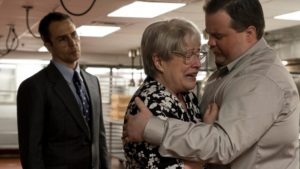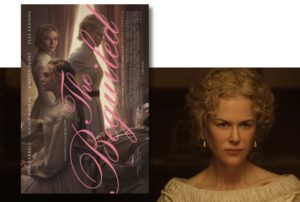Juror #2
Posted on October 25, 2024 at 5:46 pm
B-| Lowest Recommended Age: | High School |
| MPAA Rating: | Rated PG-13 for PG-13 for some violent images and strong language |
| Profanity: | Some strong language |
| Alcohol/ Drugs: | Drinking, drunkenness, and alcoholism |
| Violence/ Scariness: | Murder trial, graphic and disturbing descriptions and images of dead body |
| Diversity Issues: | None |
| Date Released to Theaters: | November 1, 2024 |
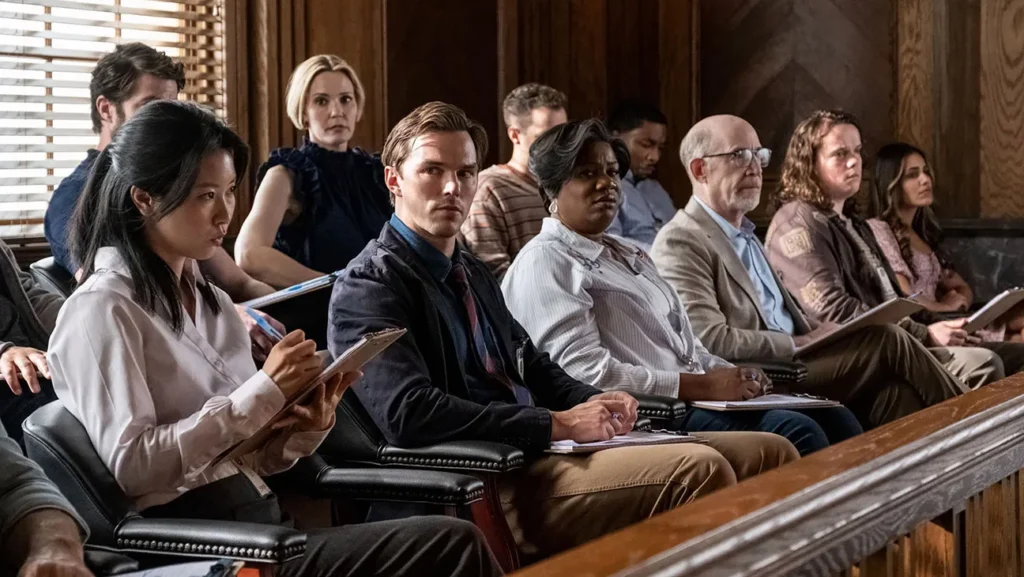
“Juror #2,” directed by Clint Eastwood, has a preposterous premise and a first-rate cast valiantly trying to make it seem less preposterous. Nicholas Hoult plays Justin, a teacher whose wife Allison (Zoey Deutch) is nearing the end of a high-risk pregnancy. Justin has just been called for jury duty. He tries to get out of it by explaining his situation, but the judge (the always excellent Amy Aquino), dryly points out that his hours in the courtroom will keep him away from his wife no longer than his hours at work.
He is assigned to a criminal case. James Michael Sythe (Gabriel Basso) has been charged with the murder of his girlfriend, Kendall (played in flashbacks by Eastwood’s daughter, Francesca Eastwood). Arguing the high-profile case are prosecutor Faith Killebrew (Toni Collette) and Eric Resnick (Chris Messina), Faith’s law school classmate and sometime drinking buddy, a public defender trying to persuade the jury that his client is innocent.
As the lawyers make their opening arguments, telling the story of the night Kendall was killed following an argument with Sythe in a rowdy bar (the bar is even named Rowdy’s, just to make sure we get the point), it begins to dawn on Justin that he was at Rowdy’s that night and saw the argument. As someone who really does not want to be there and told his wife he would do whatever it took to get out of serving, he completely ignores the fact that that memory in and of itself would be a reason to alert the judge that he is a material witness and cannot serve as a juror. But no, instead he thinks more about what happened that night and realizes that while he thought he hit a deer as he was driving home from the bar in a heavy downpour, he may have, indeed he probably did hit Kendall and is responsible for her death. And he decides on two equally important goals: not letting an innocent man be convicted of murder and keeping himself out of prison.
That’s a LOT! And then everything keeps getting melodramatically ramped up even further. Faith is running for District Attorney on a platform of protecting the community from crime, with the election just days away and apparently the vote depending on the outcome of this case. Justin is in recovery and his AA sponsor is a lawyer (Kiefer Sutherland) who advises him not to come forward. And then we are in jury deliberations a la “12 Angry Men,” with an assortment of characters. On the first round of voting, Justin is the only “not guilty.” He has to try to persuade the rest of the jury that there is reasonable doubt without letting them know about his own involvement.
One of the other jurors is a former cop (J.K. Simmons). Another is a med student. Their expertise shifts the balance, but the central question ends up being whether anyone can change.
Eastwood is 94 and outspoken about his political views (remember his debate with the empty chair?). A few cranky old guy elements flicker in and out of the film. It’s more than a low-grade potboiler with high-grade actors for him. He wants to say something about his worldview and he is not subtle. The first image in the film is Allison wearing a blindfold as Justin leads her into the room he has prepared for the baby. This is the part of a movie where usually, in the least time possible, we get to know the main characters well enough to care about whatever challenges lay before them. But Eastwood wants to say something beyond the adorable couple so excited about the new baby and so devoted to each other. The blindfold comes back a few more times in the statue of Justice in front of the courthouse, the one of the woman holding up the scales, with a blindfold over her eyes.
If he wants what may be his final film to make a statement about the inadequacies of the criminal justice system, though, it is one that is muddled by (1) a retired police detective who is dedicated and capable (though willing to act outside the law), and (2) see “preposterous” and “melodramatically” above.
Parents should know that this is the story of a murder case and there are graphic and disturbing images of the body as well as flashbacks showing the suspect and the victim drunk and fighting with each other.
Family discussion: What should Justin have done and when? What should Faith have done and when?
If you like this, try; “12 Angry Men,” “Reservation Road,” “The Judge,” and John Grisham films like “The Rainmaker” and “The Client”

